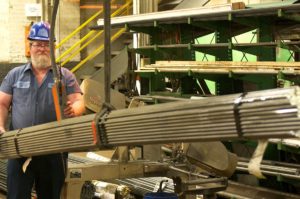
Although outsourcing may seem like a business-only activity, people outsource every day. Technically, we outsource when we go to the dentist, because we could just deep-clean our teeth ourselves; we outsource when we send children to school, because we could just teach them from home. However, in these instances, outsourcing just makes more sense: you’ll save time in order to complete other activities, you’ll save money in the long run, and chances are you’ll get a better quality product. Similarly, outsourcing heavy machinery products could save your company time and money, while producing the best product possible.
One of the main reasons companies choose to outsource their products is to reduce certain costs such as high taxes and energy utilities. However, although outsourcing has many benefits, there is a thin line to walk when choosing to outsource your product – one mistake could cost you (and your company) thousands. In order to find success with your outsourcing project, watch out for these 5 common outsourcing mistakes.
1. Skipping Due Diligence
Similar to any business collaboration process, you want to get to know the company that you’ll be working with as best as possible. However, some people get blindsided by a cheap price and a quick turnover rate that they jump at the chance to work with a company without taking the time to sit down and finalize every detail, which could end up being detrimental to the final product.
When focusing on getting to know the basics of a company, it’s recommended that you concentrate on three main areas:
- People: getting to know the culture of a company is one of the quickest ways to discover their values and goals. Try to become accustomed to the management team, because it will be a clear indicator of how a company runs its business.
- Company: become accustomed to the fundamentals of the company – their business model, stability, and flexibility are all factors that will become important when doing business with them.
- Technology: ask your future partners about the type of technology they use, including infrastructure, applications, and software, so that you’ll be more aware of the quality of products they’ll be able to create.
Outsourcing your product to a company is similar to investing in them – you’re trusting that they’ll do well enough to benefit you in the long run. So, before you commit to something that big, you should make sure you cover all of the basics with them before you begin.
2. Neglecting Constant Collaboration
Communication is key when outsourcing your product. A lot of people fall into the mindset that once you outsource your product, you don’t need to communicate with them until the product is complete – a huge mistake.
Think of all of the details that go into producing a heavy machinery part; there is a lot that could possibly be overlooked. In order to ensure that your product is being produced exactly the way you need it to be, it’s important to communicate with the outsourcing company as much as possible.
One way to do this is by setting up weekly, bi-weekly or monthly meetings with your outsourcing company to go over progress made, what still needs to be done, and if there are any obstacles standing in the way. By having clear communication about the progress of the product, there won’t be any unpleasant surprises that could end up costing your company.
If meetings won’t work out, another option is to request an electronic progress report of the product that goes over details such as the process being used, how far along the project is and estimated date of completion. Any form of communication that works between the two companies should be used in order to assure a quality product.
3. Selecting Wrong Manufacturing Company
Think of outsourcing a part like shopping for a new car. As mentioned before, people become blindsided when finding an outsourcer and can become blindsided by a good price. If people did this when shopping for a new car, they could miss out on important details like it has a bad accident record or an excessive amount of miles instead of getting a real, quality product.
People become so accustomed to the “quote-and-go” approach: as soon as they hear a number that is within their budget, they’re sold. By focusing in on details that are important to your company, you will end up with a better product and better return on investment in the future.
Before beginning your search for an outsourcer, come up with a list of criteria that would fit your “perfect manufacturing outsourcer”, including:
- Short and long term goals
- Budget
- Timeframe
Don’t become blindsided by flashy deals or an unrealistic turn over rate. Creating a quality product will be worth the time that you put into finding the best outsourcer, and you’ll be happier with the results.
In Conclusion…
Finding an outsourcer can be tough, but if you avoid these common mistakes, you’ll be on the track to a better outsourcer and a better product.
